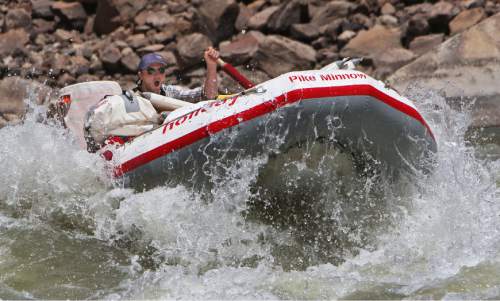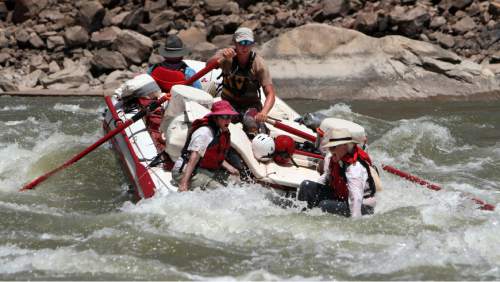This is an archived article that was published on sltrib.com in 2015, and information in the article may be outdated. It is provided only for personal research purposes and may not be reprinted.
When President Barack Obama ordered federal contractors last year to pay their employees at least a $10.10 hourly wage, river-running and cycling-tour companies near Moab and Jackson Hole, Wyo., paid little attention. After all, they're private businesses, not defense contractors or government vendors.
But new rules implementing Obama's executive order will force those outfitters to pay their guides and other workers the higher wage because they hold federal permits to take tourists down the Colorado River and in other federally managed areas. These companies, which mostly operate on a seasonal basis, say a forced increase in wages would limit the number of workers they could take on and hike costs for consumers.
"Us little guys are not winning the fight and us little guys don't want to fight," said Theresa Butler, owner of Moab Rafting and Canoe Co. in Moab, who opposes the higher-wage rule. "We just want to pay the bills and take folks out on the river."
Rep. Chris Stewart, R-Utah, is leading congressional pushback on the new rules.
Stewart has introduced legislation — heard in a House subcommittee Wednesday — that would exempt river guides and outfitters from the higher-wage order, arguing that, without the change, seasonal workers might not be able to find work and tourists could be hindered in their attempts to enjoy Utah's scenic landscapes.
The Labor Department's interpretation of Obama's order will require "a number of new regulations that will add additional compliance costs to an industry that operates on very small margins," Stewart testified Wednesday before the Oversight and Government Reform subcommittee. "This increase will force many outfitting businesses to either close or to cease operations on public lands or to operate with fewer workers."
Butler, who runs rafting trips down the Colorado River during the summer, said college kids rely on jobs like the ones she offers to save up cash for school, but she would have to hire fewer of them if the new rule sticks.
The Labor Department, which published the mandate that included outfitters and guides under Obama's order, said it carefully considered concerns raised by the groups but ultimately decided several factors would "offset any potential negative economic effects," according to Michael Lazzeri, the Labor Department's assistant administrator for government contracts.
Higher wages would benefit workers, contractors and the government, Lazzeri said Wednesday, noting positives such as reduced absenteeism, improved employee morale and productivity and increased quality of services. That, in turn, would boost customers and bring more sales.
Rep. Brenda Lawrence, D-Mich., said Stewart's bill was seeking to pay workers less than they're worth and that raising the minimum wage helps the economy.
"I'll always support the right of business to earn a profit in their chosen field," Lawrence said. "However, I do not support their right to earn extra profits at the expense of hardworking Americans."
Stewart's bill, which is likely to be voted on later by the Oversight Committee, exempts seasonal recreational businesses under the Fair Labor Standards Act from wage and hour laws. The change would put operations for rafting, horseback riding, hiking, cycling and other such ventures with ski businesses, which already enjoy such a carve-out of wage laws.





